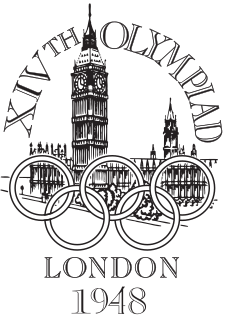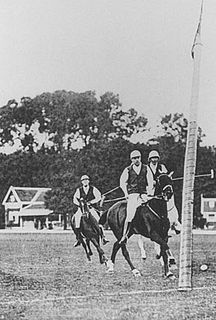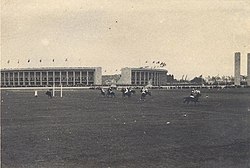
The 1948 Summer Olympics were an international multi-sport event held from 29 July to 14 August 1948 in London, England, United Kingdom. Following a twelve-year hiatus caused by the outbreak of World War II, these were the first Summer Olympics held since the 1936 Games in Berlin. The 1940 Olympic Games had been scheduled for Tokyo and then for Helsinki, while the 1944 Olympic Games had been provisionally planned for London. This was the second time London had hosted the Olympic Games, having previously hosted them in 1908, forty years earlier. The Olympics would again return to London 64 years later in 2012, making London the first city to have hosted the games three times, and the only such city until Paris and Los Angeles host their third games in 2024 and 2028, respectively. The 1948 Olympic Games were also the first of two summer Games held under the IOC presidency of Sigfrid Edström.

At the 1900 Summer Olympics, a polo tournament was contested. Matches were held on 28 May, 31 May, and 2 June. Five teams competed. Most of the teams were of mixed nationality, with British and French athletes competing on three teams. There was no playoff for third place.
Basketball at the 1936 Summer Olympics was the first appearance of the sport of basketball as an official Olympic medal event. The tournament was played between 7 August and 14 August 1936 in Berlin, Germany. 23 nations entered the competition, making basketball the largest tournament of the team sports, but Hungary and Spain withdrew, meaning 21 competed.

Football at the Summer Olympics, referred to as the Olympic Football Tournament, has been included in every Summer Olympic Games as a men's competition sport, except 1896 and 1932. Women's football was added to the official program at the Atlanta 1996 Games.

France was the host of the 1900 Summer Olympics in Paris. France was one of many nations that had competed in the 1896 Summer Olympics in Greece and had returned to compete at the 1900 Games.

The United Kingdom of Great Britain and Ireland competed as Great Britain at the 1900 Summer Olympics in Paris, France. It was the second appearance of Britain after having participated in the inaugural 1896 Games. In Olympic competition, the nation has always shortened its official name to Great Britain rather than the United Kingdom seen elsewhere.

Athletes from the United Kingdom, all but three of its Overseas Territories, and the three Crown Dependencies, can compete in the Olympic Games as part of Team GB. Athletes from Northern Ireland can also choose to compete as part of Team Ireland instead. It has sent athletes to every Summer and Winter Games, since the start of the Olympics' modern era in 1896, including the 1980 Summer Olympics, which were boycotted by a number of other Western nations. From 1896 to 2020 inclusive, Great Britain & NI has won 918 medals at the Summer Olympic Games, and another 32 at the Winter Olympic Games. It is the only national team to have won at least one gold medal at every Summer Games, lying third globally in the winning of total medals, surpassed only by the United States and the former Soviet Union.

The modern Olympic Games were founded by French historian Pierre de Coubertin, and France has competed in each edition, with the possible exception of the 1904 Games.

Peru has officially participated in 17 Summer Olympic Games and 2 Winter Olympic Games. They did not send any athletes to the 1952 Summer Olympics. The Peruvian Olympic Committee is the National Olympic Committee for Peru which was founded in 1924 and recognized by the International Olympic Committee in 1936.

Water polo has been part of the Summer Olympics program since the second games, in 1900. A women's water polo tournament was introduced for the 2000 Summer Olympics. Hungary has been the most successful country in men's tournament, while the United States is the only team to win multiple times at the women's tournament since its introduction. Italy is the first and only country to win both the men's and women's water polo tournaments.

France competed at the 1928 Summer Olympics in Amsterdam, Netherlands. 255 competitors, 219 men and 36 women, took part in 112 events in 17 sports. At the beginning of the games there was an incident where a French coach was physically assaulted by a Stadium gatekeeper who refused him entry. It boiled over to a point where the entire French team did not participate in the Parade of Nations, and conversations were made to pull out of the games completely. However, the issue was resolved and France went on to compete.

Great Britain, represented by the British Olympic Association (BOA), competed at the 1920 Summer Olympics in Antwerp, Belgium. 234 competitors, 218 men and 16 women, took part in 84 events in 21 sports. British athletes won fourteen gold medals and 43 medals overall, finishing third. It would be the last Olympic Games in which Irish athletes participated under Great Britain, after foundation of Irish Free State in 1922.

Great Britain, represented by the British Olympic Association (BOA), competed at the 1924 Summer Olympics in Paris, France. This was the first Summer Olympics in which athletes from the newly independent Irish Free State competed separately. Following the Royal and Parliamentary Titles Act 1927, the name changed (officially) to 'United Kingdom of Great Britain and Northern Ireland' but the Olympic team competed as Great Britain from the 1928 games onwards. 267 competitors, 239 men and 28 women, took part in 115 events in 18 sports.

Spain competed at the 1920 Summer Olympics in Antwerp, Belgium. It was only the second appearance of the nation at the Summer Games, after competing in the 1900 Summer Olympics, but missing the Games in 1904, 1908, and 1912. 58 competitors, all men, took part in 29 events in 7 sports.
The 1928 Summer Olympics Water Polo event was held between the fourth and eleventh of August. The final results of the tournament follow below.

A polo tournament was contested at the 1924 Summer Olympics in Paris. The competition ran from 28 June to 12 July at the Château de Bagatelle and the Saint-Cloud Racecourse, with five teams competing. Argentina won the gold medal, beating all four of the other nations in the country's Olympic polo debut. Silver went to the United States, which played in—and won—the first three games of the tournament before a close-played (6–5) loss to Argentina in game 6. Great Britain, the two-time defending champions, finished with bronze.
Peru Olympic football team represents Peru in international football competitions in multi-sport events such as the Olympic Games and the Pan American Games. The selection is limited to players under the age of 23, except three overage players. The team is controlled by the Peruvian Football Federation (FPF). Peru has participated in two Olympic football tournaments, one Pan American football tournament, and 7 Bolivarian football tournaments under this category.
This article presents the national team appearances in the men's Olympic water polo tournament since the inaugural official edition in 1900.










